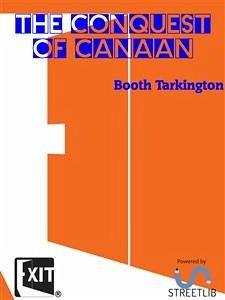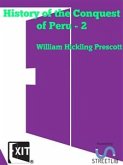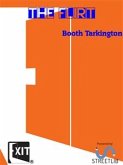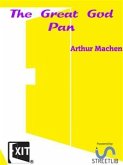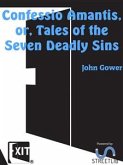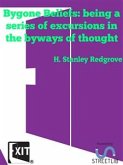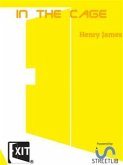I
ENTER CHORUS
A dry snow had fallen steadily throughout the still night, so that when a cold, upper wind cleared the sky gloriously in the morning the incongruous Indiana town shone in a white harmony—roof, ledge, and earth as evenly covered as by moonlight. There was no thaw; only where the line of factories followed the big bend of the frozen river, their distant chimneys like exclamation points on a blank page, was there a first threat against the supreme whiteness. The wind passed quickly and on high; the shouting of the school-children had ceased at nine o'clock with pitiful suddenness; no sleigh-bells laughed out on the air; and the muffling of the thoroughfares wrought an unaccustomed peace like that of Sunday. This was the phenomenon which afforded the opening of the morning debate of the sages in the wide windows of the "National House."
Only such unfortunates as have so far failed to visit Canaan do not know that the "National House" is on the Main Street side of the Court-house Square, and has the advantage of being within two minutes' walk of the railroad station, which is in plain sight of the windows—an inestimable benefit to the conversation of the aged men who occupied these windows on this white morning, even as they were wont in summer to hold against all comers the cane-seated chairs on the pavement outside. Thence, as trains came and went, they commanded the city gates, and, seeking motives and adding to the stock of history, narrowly observed and examined into all who entered or departed. Their habit was not singular. He who would foolishly tax the sages of Canaan with a bucolic light-mindedness must first walk in Piccadilly in early June, stroll down the Corso in Rome before Ash Wednesday, or regard those windows of Fifth Avenue whose curtains are withdrawn of a winter Sunday; for in each of these great streets, wherever the windows, not of trade, are widest, his eyes must behold wise men, like to those of Canaan, executing always their same purpose.
Hinweis: Dieser Artikel kann nur an eine deutsche Lieferadresse ausgeliefert werden.
ENTER CHORUS
A dry snow had fallen steadily throughout the still night, so that when a cold, upper wind cleared the sky gloriously in the morning the incongruous Indiana town shone in a white harmony—roof, ledge, and earth as evenly covered as by moonlight. There was no thaw; only where the line of factories followed the big bend of the frozen river, their distant chimneys like exclamation points on a blank page, was there a first threat against the supreme whiteness. The wind passed quickly and on high; the shouting of the school-children had ceased at nine o'clock with pitiful suddenness; no sleigh-bells laughed out on the air; and the muffling of the thoroughfares wrought an unaccustomed peace like that of Sunday. This was the phenomenon which afforded the opening of the morning debate of the sages in the wide windows of the "National House."
Only such unfortunates as have so far failed to visit Canaan do not know that the "National House" is on the Main Street side of the Court-house Square, and has the advantage of being within two minutes' walk of the railroad station, which is in plain sight of the windows—an inestimable benefit to the conversation of the aged men who occupied these windows on this white morning, even as they were wont in summer to hold against all comers the cane-seated chairs on the pavement outside. Thence, as trains came and went, they commanded the city gates, and, seeking motives and adding to the stock of history, narrowly observed and examined into all who entered or departed. Their habit was not singular. He who would foolishly tax the sages of Canaan with a bucolic light-mindedness must first walk in Piccadilly in early June, stroll down the Corso in Rome before Ash Wednesday, or regard those windows of Fifth Avenue whose curtains are withdrawn of a winter Sunday; for in each of these great streets, wherever the windows, not of trade, are widest, his eyes must behold wise men, like to those of Canaan, executing always their same purpose.
Hinweis: Dieser Artikel kann nur an eine deutsche Lieferadresse ausgeliefert werden.

